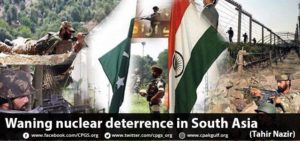
Asma Khalid 29 November, 2018
The strategic landscape of the South Asia is comprised of India and Pakistan’s equation connected with the role of other great powers in region. Geo-strategic position and introduction of nuclear arsenal has played central role to transform the relations among South Asian states and great powers.
The conflicting national interests, historic rivalries, states objective to enhance conventional and strategic forces quantitatively and qualitatively and role of great powers in regional politics has increased the complexities of South Asian strategic environment. The recent trends, such as Trumps offensive rhetoric against Pakistan, Indo-US nexus, Russia’s role in strategic calculus of India and Pakistan, and China’s expanding strategic interests and economic investment in the region has identified the profound changes in the South Asian politics.
Significance of South Asia in the strategic calculation of great powers i.e. US, Russia and China cannot be ignored. It is important to explore that why South Asian region is important for the great powers? In the case of US: involvement of US in Afghanistan, existence of Chinese strategic and economic presence in the region and non-proliferation concerns has played important role in evolution of relationship between US and South Asia. Russia’s role in the South Asia is increasing due to two factors: First, strategic interest including evolving Afghan situation; Second, economic benefits from regional states. Consequently, driving factor for China’s role in South Asia’s politics is its strategic interests in the region as well as South Asian states are viewed important to fulfill its objective of economic integration.
Strategic co-operation of India and the US has changed the pattern of relationships between the India, Pakistan and US. South Asia is important for the US due to its interests in Central and West Asia. Since August 2017, Pakistan-US relations are on critical stage due to the criticism of Trump administration on Pakistan’s role in war in terror. On the other side, the positive trajectory of Indo-US relation: growing bilateral ties in defence and economic sphere, geoploliticising of nuclear cartels including NSG, and American support in multilateral international agreements such as STA-1 and COMCASA has dramatically changed the South Asian nuclear politics . Therefore in the US, India is viewed as stable economy, special ally in reconstructing Afghanistan, and counterbalance to China. Pakistan is seen differently with opposite lens. Additionally, Strategic role of China in the Indian Ocean Region and construction of CPEC are grave concerns of US in the region. Existing trends in South Asia, demonstrates the existence of focused regional strategy of the US in South Asia.
Russia is major defence partner and primary supplier of conventional and strategic weapon systems to India. Russia has provided cruise missiles, combat jets and battle tanks to India. Both states have recently signed the S-400 missile system deal. At the same time, Russia is expanding its defence sales in South Asia and provided the Mi-35M to Pakistan in 2017. Pakistan and Russia are enhancing defence and military ties and conducted the two joint exercises between Russia’s forces and Special Forces of Pakistan. These developments have indicated that Russia is diversifying its defence and economic interests in region.
China’s policy in South Asia is comprised of two rationales: First, economic interests based on the objectives of economic integration; Second, strategic interests to maintain stability in Afghanistan and Pakistan as well as enhancing its diplomatic and economic influence with other state of South Asia.
South Asia is indispensible region for great powers due to its political, geo-strategic and economic significance. Power play of super powers in the region has negatively affected the strategic dynamics of south Asia especially the balance of power has been disturbed between south Asian nuclear neighbors due to the polarization between China, Russia and US. Significantly, region is essential for great powers to pursue their strategic interests in Asia. In recent years, a major shift has been observed in the South Asia policy of the US. Offensive rhetoric of Trump administration shows that India-US strategic ties are getting stronger. The US is using the India’s card to counterbalance the China in the region. In this regard, US is playing key role in modernizing the conventional and strategic forces of India. Indo-U.S Nuclear deal, special NSG waiver, membership of WA and MTCR to the India has potential to disturb the strategic balance in South Asia. These nuclear politics has negatively affected the South Asian strategic dynamics as well as global non-proliferation efforts. In order to maintain deterrence equilibrium and stability in the region, it is imperative for Pakistan to modernize its conventional and strategic forces. Pakistan has maintained the credibility of its deterrence through development of sophisticated battle field weapons such as “Nasr” and “Ababeel”. But still, growing ties of India and US, expanding defence acquisitions of the India and emerging security and strategic environment of South Asia, necessitates Pakistan to increase strategic ties with China and Russia to ensure interests at national, regional and global level.
